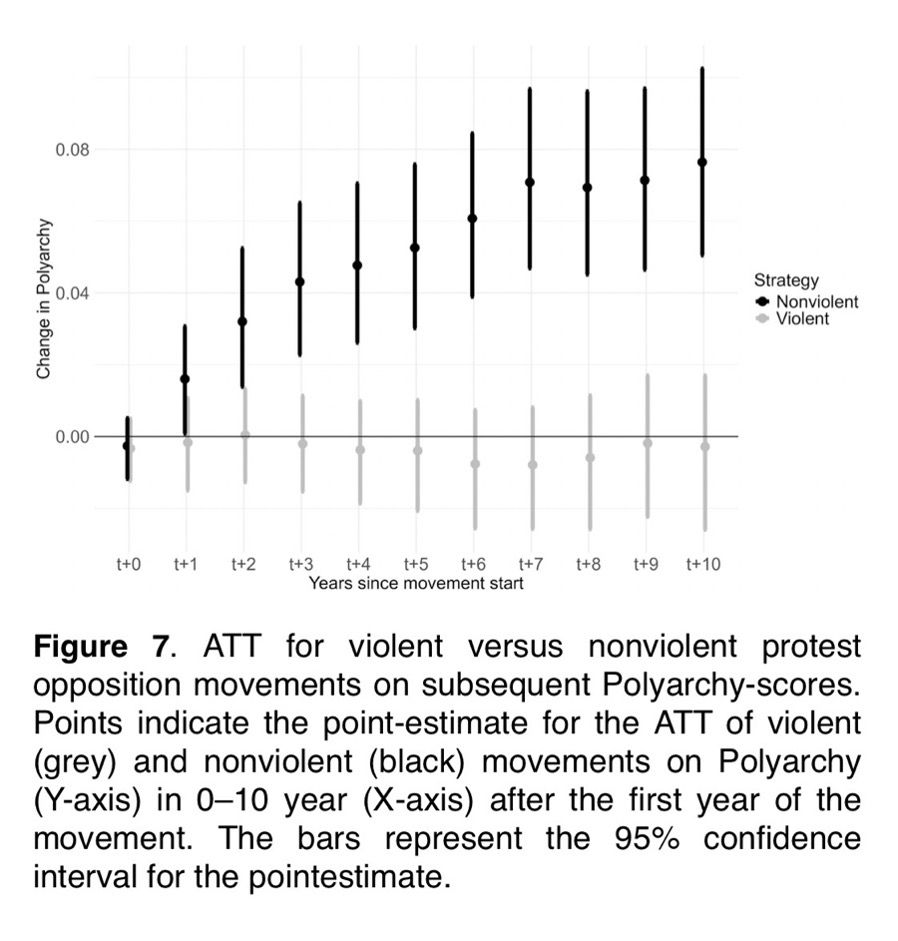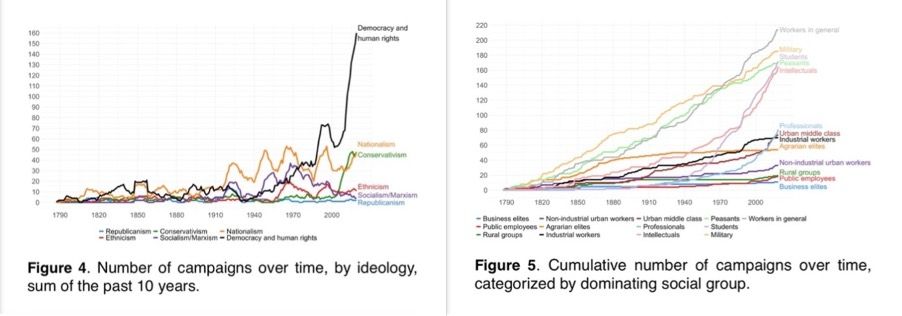Marianne Dahl
@mariannedahl.bsky.social
Senior researcher @PRIOresearch and deputy editor @JPR_journal, Non-violence, security force behavior, democratization & peace processes. Opinions are my own. Webpage: www.mariannedahl.com
Thank you for all your amazing contributions to the class, Sara! I Truls loved to teach this fantastic group!
November 11, 2025 at 7:55 AM
Thank you for all your amazing contributions to the class, Sara! I Truls loved to teach this fantastic group!
Macado risikerer livet i kampen for demokrati – med ikke-voldelige midler. Jeg har skrevet om henne, Venezuela, og hva forskningen sier om å forsvare demokratiet uten vold. Spoiler alert, men som tittelen avslører så synes jeg at det er en veldig fin pris: www.aftenposten.no/meninger/kro...

Fredsprisen til María Corina Machado treffer tidsånden
Årets fredspris er en påminnelse om at demokratiets fremtid hviler på dem som våger å protestere uten vold.
www.aftenposten.no
October 13, 2025 at 5:30 PM
Macado risikerer livet i kampen for demokrati – med ikke-voldelige midler. Jeg har skrevet om henne, Venezuela, og hva forskningen sier om å forsvare demokratiet uten vold. Spoiler alert, men som tittelen avslører så synes jeg at det er en veldig fin pris: www.aftenposten.no/meninger/kro...
Thank you, Ina😘
September 16, 2025 at 10:32 AM
Thank you, Ina😘
🔗 Read the article: journals.sagepub.com/doi/full/10....
📖 Explore the special issue: journals.sagepub.com/doi/full/10....
#Democracy #Ukraine #War #ConflictResearch #PeaceResearch #PoliticalViolence #ComparativePolitics
📖 Explore the special issue: journals.sagepub.com/doi/full/10....
#Democracy #Ukraine #War #ConflictResearch #PeaceResearch #PoliticalViolence #ComparativePolitics

Conflict exposure and democratic values: Evidence from wartime Ukraine - Kristin M Bakke, Marianne Dahl, Kit Rickard, 2025
How do experiences of violence in war shape ordinary people’s commitment to democratic principles? Wars often lead to a temporary suspension of democratic right...
journals.sagepub.com
September 16, 2025 at 8:44 AM
🔗 Read the article: journals.sagepub.com/doi/full/10....
📖 Explore the special issue: journals.sagepub.com/doi/full/10....
#Democracy #Ukraine #War #ConflictResearch #PeaceResearch #PoliticalViolence #ComparativePolitics
📖 Explore the special issue: journals.sagepub.com/doi/full/10....
#Democracy #Ukraine #War #ConflictResearch #PeaceResearch #PoliticalViolence #ComparativePolitics
👉 These results underscore Ukraine’s democratic resilience while showing why we must study specific democratic principles—not just “democracy” in the abstract.
September 16, 2025 at 8:44 AM
👉 These results underscore Ukraine’s democratic resilience while showing why we must study specific democratic principles—not just “democracy” in the abstract.
🧩Theory:
• Violence consistently undermines minority rights
• For elections & speech → violence creates competing pressures: sometimes reinforcing, sometimes eroding support
• Violence consistently undermines minority rights
• For elections & speech → violence creates competing pressures: sometimes reinforcing, sometimes eroding support
September 16, 2025 at 8:44 AM
🧩Theory:
• Violence consistently undermines minority rights
• For elections & speech → violence creates competing pressures: sometimes reinforcing, sometimes eroding support
• Violence consistently undermines minority rights
• For elections & speech → violence creates competing pressures: sometimes reinforcing, sometimes eroding support
🔑 Findings:
• Those injured or bereaved → somewhat less supportive of minority rights
• Weaker evidence of effects on free speech
• Commitment to elections remains resilient
• Those injured or bereaved → somewhat less supportive of minority rights
• Weaker evidence of effects on free speech
• Commitment to elections remains resilient
September 16, 2025 at 8:44 AM
🔑 Findings:
• Those injured or bereaved → somewhat less supportive of minority rights
• Weaker evidence of effects on free speech
• Commitment to elections remains resilient
• Those injured or bereaved → somewhat less supportive of minority rights
• Weaker evidence of effects on free speech
• Commitment to elections remains resilient
💡 Our findings highlight Ukraine’s democratic resilience, even in the face of war.
Based on surveys in Ukraine (Oct 2022 & July 2024), we study how wartime violence shapes support for:
🗳 Free & fair elections
🗣 Freedom of speech
🤝 Minority rights
Based on surveys in Ukraine (Oct 2022 & July 2024), we study how wartime violence shapes support for:
🗳 Free & fair elections
🗣 Freedom of speech
🤝 Minority rights
September 16, 2025 at 8:44 AM
💡 Our findings highlight Ukraine’s democratic resilience, even in the face of war.
Based on surveys in Ukraine (Oct 2022 & July 2024), we study how wartime violence shapes support for:
🗳 Free & fair elections
🗣 Freedom of speech
🤝 Minority rights
Based on surveys in Ukraine (Oct 2022 & July 2024), we study how wartime violence shapes support for:
🗳 Free & fair elections
🗣 Freedom of speech
🤝 Minority rights
Big congrats, Amalie!☺️ Much looking forward to reading this version of this great paper!
September 8, 2025 at 8:12 PM
Big congrats, Amalie!☺️ Much looking forward to reading this version of this great paper!
Malin Nærum Aadalen, Stine Bosheim, @sunnivahustad.bsky.social, Jens Koning, Fredrik Methi, @amalienilsen.bsky.social, @solneg.bsky.social, @amobermeier.bsky.social, Madeleine Oppøyen, Rebekka Ringholm, Jan Rustemeyer, Tora Sagård, Mette Sandstad, and Carina Strøm-Sedgwick
August 29, 2025 at 11:16 AM
Malin Nærum Aadalen, Stine Bosheim, @sunnivahustad.bsky.social, Jens Koning, Fredrik Methi, @amalienilsen.bsky.social, @solneg.bsky.social, @amobermeier.bsky.social, Madeleine Oppøyen, Rebekka Ringholm, Jan Rustemeyer, Tora Sagård, Mette Sandstad, and Carina Strøm-Sedgwick
Big shout-out to our amazing research assistants 👏 Over 4+ years, they worked with care and dedication to make this data collection possible. We’re so grateful for their hard work and commitment: (see next thread:-)
August 29, 2025 at 11:16 AM
Big shout-out to our amazing research assistants 👏 Over 4+ years, they worked with care and dedication to make this data collection possible. We’re so grateful for their hard work and commitment: (see next thread:-)
Read the full article in Comparative Political Studies: doi.org/10.1177/0010...

Mass Mobilization in the Modern Era: Introducing the Opposition Movements and Groups (OMG) Dataset, 1789–2019 - Marianne Dahl, Sirianne Dahlum, Hanne Fjelde, Haakon Gjerløw, Carl Henrik Knutsen, Carina Strøm-Sedgwick, Tore Wig, 2025
The nature and consequences of mass mobilization are core topics in the social sciences. How have mass mobilization movements evolved over time? How do key char...
doi.org
August 29, 2025 at 11:08 AM
Read the full article in Comparative Political Studies: doi.org/10.1177/0010...
🔑 Key findings:
• Nonviolent campaigns are more likely to foster democratization after 1900— but outcomes depend on who participates and what they want.
• Students, workers & intellectuals drive democratic change.
• Peasants, middle classes & militaries usually don’t.
• Nonviolent campaigns are more likely to foster democratization after 1900— but outcomes depend on who participates and what they want.
• Students, workers & intellectuals drive democratic change.
• Peasants, middle classes & militaries usually don’t.

August 29, 2025 at 11:08 AM
🔑 Key findings:
• Nonviolent campaigns are more likely to foster democratization after 1900— but outcomes depend on who participates and what they want.
• Students, workers & intellectuals drive democratic change.
• Peasants, middle classes & militaries usually don’t.
• Nonviolent campaigns are more likely to foster democratization after 1900— but outcomes depend on who participates and what they want.
• Students, workers & intellectuals drive democratic change.
• Peasants, middle classes & militaries usually don’t.
We show:
• OMG covers pro-democracy, anti-liberal & pro-regime campaigns.
• Social bases are diverse—no group dominates > 1/8 of movements.
• Ideologies shifted: nationalism, conservatism, liberalism → socialism → democracy & human rights, with nationalism constant.
• OMG covers pro-democracy, anti-liberal & pro-regime campaigns.
• Social bases are diverse—no group dominates > 1/8 of movements.
• Ideologies shifted: nationalism, conservatism, liberalism → socialism → democracy & human rights, with nationalism constant.

August 29, 2025 at 11:08 AM
We show:
• OMG covers pro-democracy, anti-liberal & pro-regime campaigns.
• Social bases are diverse—no group dominates > 1/8 of movements.
• Ideologies shifted: nationalism, conservatism, liberalism → socialism → democracy & human rights, with nationalism constant.
• OMG covers pro-democracy, anti-liberal & pro-regime campaigns.
• Social bases are diverse—no group dominates > 1/8 of movements.
• Ideologies shifted: nationalism, conservatism, liberalism → socialism → democracy & human rights, with nationalism constant.
In the paper, we describe the dataset and how it was constructed, discuss validity and reliability, etc. In addition, we present several important trends in mass mobilization over the last 200+ years.
August 29, 2025 at 11:08 AM
In the paper, we describe the dataset and how it was constructed, discuss validity and reliability, etc. In addition, we present several important trends in mass mobilization over the last 200+ years.
From the French Revolution to the Arab Spring to the Umbrella Movement in Hong Kong, OMG documents mass movements’ goals, strategies, ideologies, size, duration, and social backgrounds. It’s a unique resource for researchers studying, e.g., how and when mass mobilization has shaped political change
August 29, 2025 at 11:08 AM
From the French Revolution to the Arab Spring to the Umbrella Movement in Hong Kong, OMG documents mass movements’ goals, strategies, ideologies, size, duration, and social backgrounds. It’s a unique resource for researchers studying, e.g., how and when mass mobilization has shaped political change
The article is open access, and the dataset is publicly available: dataverse.harvard.edu/dataset.xhtm... We hope that many will use it!
Together with: @sirianned.bsky.social @haakongjerlw.bsky.social @chknutsen.bsky.social @torewig.bsky.social @hannefjelde.bsky.social and Carina Strøm-Sedgewick
Together with: @sirianned.bsky.social @haakongjerlw.bsky.social @chknutsen.bsky.social @torewig.bsky.social @hannefjelde.bsky.social and Carina Strøm-Sedgewick
dataverse.harvard.edu
August 29, 2025 at 11:08 AM
The article is open access, and the dataset is publicly available: dataverse.harvard.edu/dataset.xhtm... We hope that many will use it!
Together with: @sirianned.bsky.social @haakongjerlw.bsky.social @chknutsen.bsky.social @torewig.bsky.social @hannefjelde.bsky.social and Carina Strøm-Sedgewick
Together with: @sirianned.bsky.social @haakongjerlw.bsky.social @chknutsen.bsky.social @torewig.bsky.social @hannefjelde.bsky.social and Carina Strøm-Sedgewick

